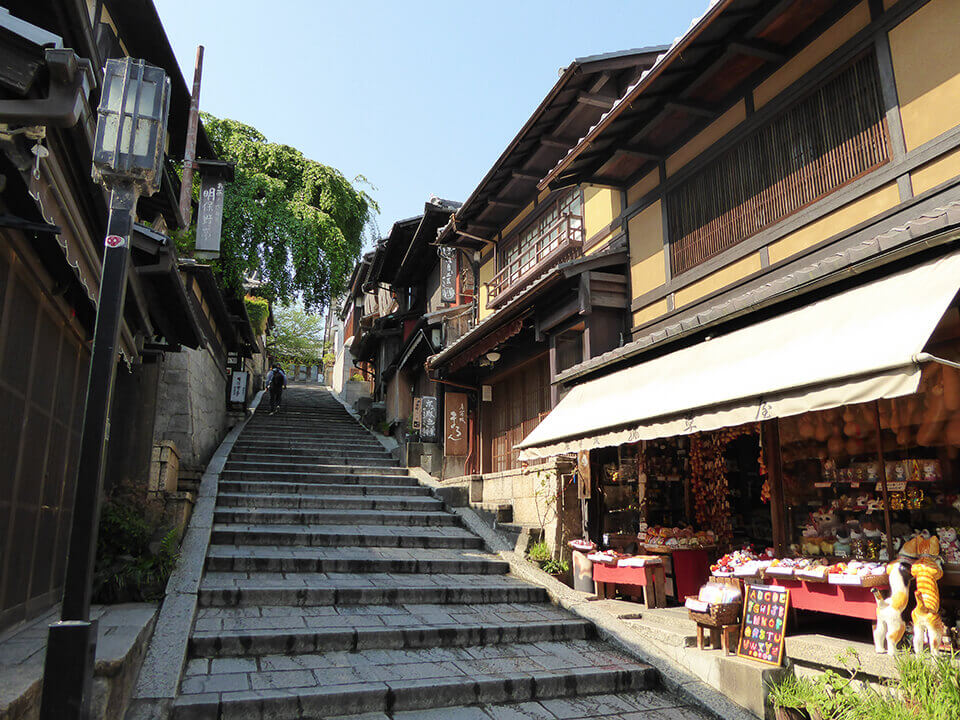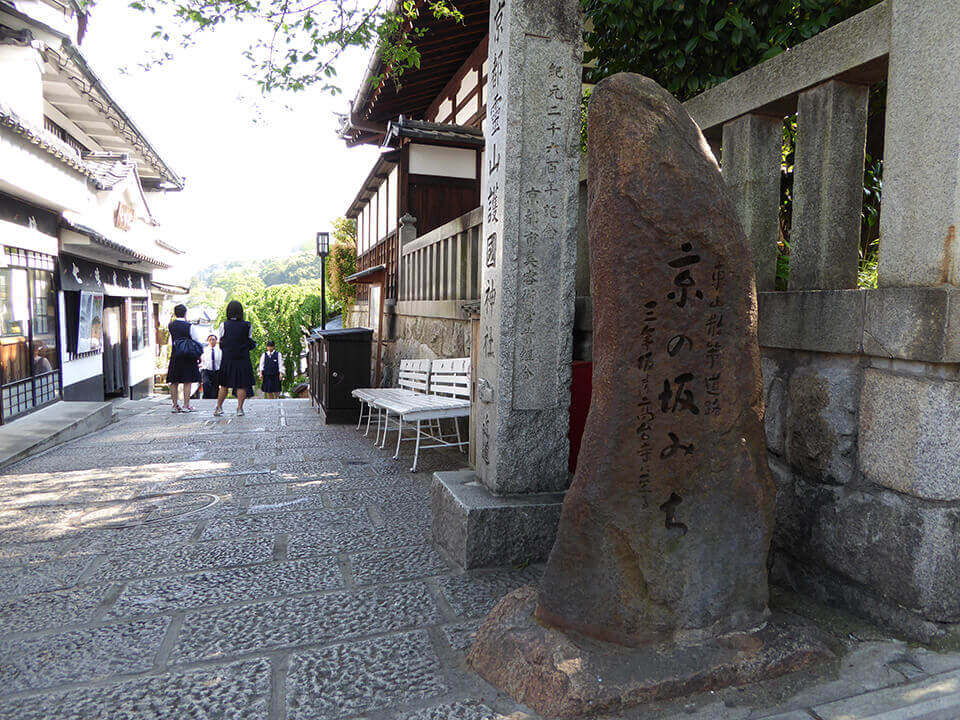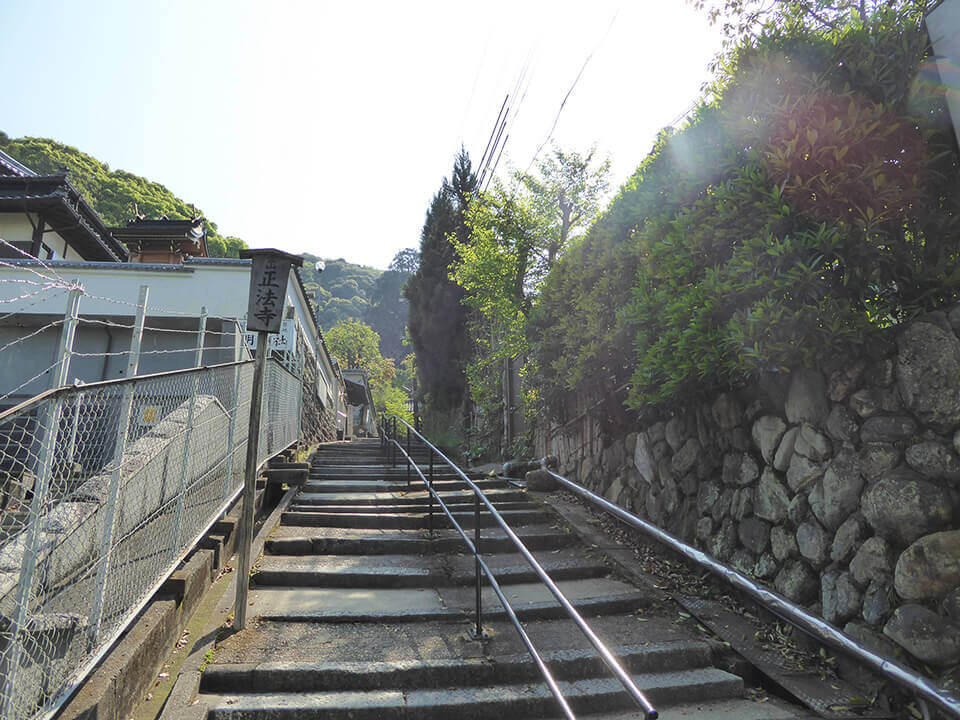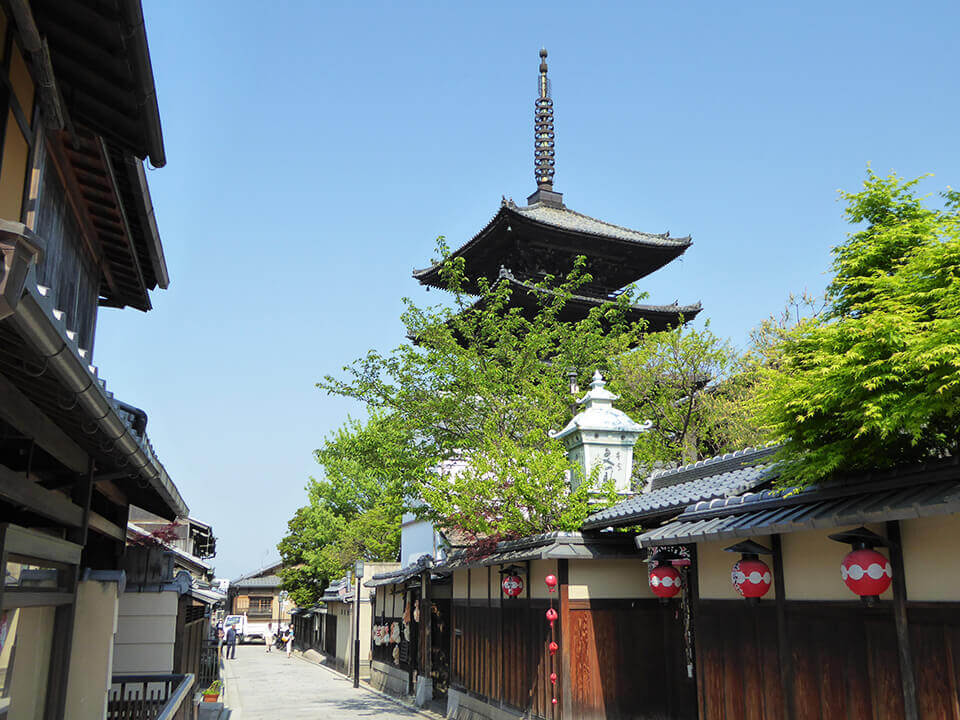
One of the tourist attractions in Kyoto,There are a number of slopes that must be passed through to reach Kiyomizu-dera Temple.The name of the surrounding area is "Yasaka" (meaning "eight slopes"), and it can be said to be a town of slopes. There are eight slopes: Kiyomizu-zaka, Sannen-zaka (San-nenzaka), Yamano-izaka, Reizan-zaka, Hokanji-zaka, Shimogawara-zaka, Choraku-zaka, and Gion-zaka, and they are collectively called "Yasaka.
Among them, the rather frightening episode related to the name of Sannenzaka (Sanneizaka) is well known.If you fall down this hill, you'll be dead in three years.I heard that the legend of the gourd is still alive. Even today, when I see gourds to ward off evil spirits being sold at a store halfway up the hill, I can't just laugh it off as just a legend. I can't help but be cautious on my way up and down the hill.

Stone steps of Sannenzaka. The store on the right is "Hyotan-ya" (gourd shop)
According to one theory, the name "Sannenzaka" was derived from the year the hill was built, Daido 3 (808). Walking down the slope, you will find that the cobblestone pavement is neatly laid out, clean, and lined with machiya-style souvenir stores, restaurants, and museums on both sides, giving you a true sense of the Kyoto atmosphere.
But still, why?This tasteful slope must have given birth to the strange legend that one dies within three years?
that isHistory of this neighborhoodThis may have something to do with the
In the past, this area, called Toribeno, was one of the three major burial grounds in Kyoto. The south side of the area from Sannenzaka to Kiyomizu-zaka (beyond Kiyomizu-zaka) was the place of burial (the area of the dead),The area around this hill is the border between "the other world" and "this world.It was also a place where Buddhist priests used to write sutras (Hokkekyo) on wooden blocks for the dead. The Kyosho-do (Raigo-in Temple), which stands northeast of the intersection of Sannen-zaka and Kiyomizu-zaka, is said to have been the place where monks used to write sutras (Hokke-kyo) on wooden blocks for the dead, and across from it was Aizen-do (commonly known as Ubado), which has a statue of the robed woman from Sanzu River.

The corner from Sannenzaka to Kiyomizu-zaka. On the right is Kyoshodo
It is said that the unique origin of this slope and its meaning of reminding pregnant women who visit the Koyasato Pagoda of Kiyomizu Temple to be careful not to injure themselves by falling down the steep slope also gave rise to the rumor, "If you fall down on Sannenzaka, you will die within three years.
I also came across this episode. An old monk fell down on this slope, and the owner of a gourd shop in the middle of the slope helped him up and told him about the legend. The old monk was happy to hear that he had three more years to live, even though he had thought he was an old man and would die any day.
By the way, there are Ichinen-zaka, Ninen-zaka, and Sannen-zaka in this area, and in fact, there seems to be a Shinen-zaka as well. The slope with stone steps leading from Nichinen-zaka to Shoho-ji Temple is called Shinen-zaka.

Slope of stone steps leading from Ryoma-zaka (Shinen-zaka) to Shobo-ji Temple
On the north side of the slope is the Reizan Gokoku Shrine, which is also called Ryoma-zaka or the path of burial of the late Shiho (patriarchs) of the Tokugawa shogunate, because of the graves of Ryoma and others. I once heard a story about this slope from a resident of Ninenzaka.
The person's grandfather became critically ill and lost consciousness. Later, when he came back to life, the grandfather mentioned, "When I came to, I was standing on the stone steps of the slope going to Shoboji Temple. Since then, the family has not called the slope "Ryoma-zaka," but "Shinen-zaka. Shinen" means a slope where one cannot or will not die.
Although Shinenzaka is located right next to the tourist-filled Ninenzaka slope, it is almost deserted. It stands there quietly, as if blending in with the surrounding landscape.
Since ancient times, hills have been regarded, along with bridges and tsuji (streets), as passageways to other worlds connecting the afterlife and this world, as typified by the Yomotsuhirasaka of Japanese mythology. As one climbs up the slope, one is nervous about what lies ahead.Perhaps it is because the DNA of Japanese mythology is firmly inherited by modern people that they feel a sense of mystery in the slope.

Yasaka Tower
Tradition that exists everywhere in the city of Kyoto. It is not just a picture, it is secretly alive in this modern age and continues to coexist with people. The two of Office TO, who previously wrote a series of articles "Kyoto's Demon World Exploration" in the monthly magazine Leaf, explore the mysterious "different" world of Kyoto, which was created over 1200 years. I will unravel the story while actually visiting the place. .
 News
News Feature article
Feature article Featured event
Featured event